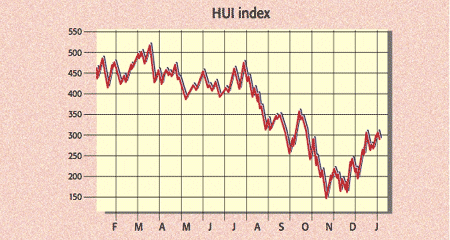Capitalise on higher interest rates with gilt funds
David C Stevenson looks at funds to profit from rising gilt yields.


Get the latest financial news, insights and expert analysis from our award-winning MoneyWeek team, to help you understand what really matters when it comes to your finances.
You are now subscribed
Your newsletter sign-up was successful
Want to add more newsletters?

Twice daily
MoneyWeek
Get the latest financial news, insights and expert analysis from our award-winning MoneyWeek team, to help you understand what really matters when it comes to your finances.

Four times a week
Look After My Bills
Sign up to our free money-saving newsletter, filled with the latest news and expert advice to help you find the best tips and deals for managing your bills. Start saving today!
Over the past decade, the two-year yield on government securities, otherwise known as gilts, has hardly been worth writing about. However, as interest rates have risen, even mass-market news websites such as the BBC have started covering gilt yields, largely as a proxy for mortgage rates.
The current broad two-year gilt rate is running at 5.14% whereas, for much of the last decade, it was slumbering under 1% and I’d argue there’s a good chance it could go much higher.
There’s a perfectly respectable – even consensus – argument that the Bank of England (BoE) was complacent in the early days of rising inflation. It didn’t react with the same fortitude and determination as the US Federal Reserve and when it did start increasing rates, the steps were incremental and frankly a bit plodding: plenty of sensible 25 basis point increases. Now the genie is out of the bottle and inflation is clearly a problem.
MoneyWeek
Subscribe to MoneyWeek today and get your first six magazine issues absolutely FREE

Sign up to Money Morning
Don't miss the latest investment and personal finances news, market analysis, plus money-saving tips with our free twice-daily newsletter
Don't miss the latest investment and personal finances news, market analysis, plus money-saving tips with our free twice-daily newsletter
The BoE gets tougher
Whatever view you take of the inflation debate it's now obvious that the BoE feels like it needs to be tougher and is signalling more increases. For its part, the market is projecting rates could hit 6.25% at the peak of the cycle (likely towards the end of the year). A peak rate of 5.5% or more seemed outlandish only a few months ago, whereas now it seems conservative.
There are both active and passive gilt funds available for investors to buy. The active fund with the most exposure to short-dated paper is the Royal London’s Short Duration Gilts fund, with virtually all of its assets invested in bonds maturing in the next four years. Its largest holding, making up 27% of assets, matures in 2025. It has an ongoing charges figure of 0.29%.
The biggest passive funds in the space are ETFs run by the fund giant iShares. iShares II Plc Core UK Gilts (IGLT) owns maturities ranging up to 10 years. These long maturity gilts are much more sensitive to changing rate expectations and thus much more volatile. By contrast, the iShares III Plc UK GILTS 0-5yr (IGLS) focuses – like the Royal London fund – on zero-to-five-year durations (as its name suggests) via 17 individual gilts. Charges are very competitive at 0.07%. The average asset-weighted yield to maturity is currently running at 4.4% with a weighted average maturity of 2.3 years.
Both the active and passive funds I’ve mentioned could be seen as what I call money market plus accounts – they are similar to money market funds but with more fund price volatility.
Crucially, if gilt yields do rise – as I think is possible – then we might see more downwards price pressure on the value of these funds even as yields increase (gilt prices move inversely to yields).
Money market options
Money market funds are another option for investors who want to earn a higher return on their cash.
These funds generally buy very short-dated paper, which is more akin to cash than bonds with the goal of tracking prevailing interest rates. Unlike the gilt funds, which own gilts backed by the government, these funds own a mix of paper, including UK Treasury bills as well as corporate debt. Vanguard’s Sterling Short-Term Money Market Fund has a weighted average maturity of 32.6 days and a yield to maturity of 4.6%. The ongoing charge is 0.12%.
Another option is Royal London’s Short Term Money Market fund. With an ongoing charge of 0.1% it’s cheaper than Vanguard’s offering and has £5b plus of assets, compared to £335m for Vanguard.
Get the latest financial news, insights and expert analysis from our award-winning MoneyWeek team, to help you understand what really matters when it comes to your finances.

David Stevenson has been writing the Financial Times Adventurous Investor column for nearly 15 years and is also a regular columnist for Citywire.
He writes his own widely read Adventurous Investor SubStack newsletter at davidstevenson.substack.com
David has also had a successful career as a media entrepreneur setting up the big European fintech news and event outfit www.altfi.com as well as www.etfstream.com in the asset management space.
Before that, he was a founding partner in the Rocket Science Group, a successful corporate comms business.
David has also written a number of books on investing, funds, ETFs, and stock picking and is currently a non-executive director on a number of stockmarket-listed funds including Gresham House Energy Storage and the Aurora Investment Trust.
In what remains of his spare time he is a presiding justice on the Southampton magistrates bench.
-
 Can mining stocks deliver golden gains?
Can mining stocks deliver golden gains?With gold and silver prices having outperformed the stock markets last year, mining stocks can be an effective, if volatile, means of gaining exposure
-
 8 ways the ‘sandwich generation’ can protect wealth
8 ways the ‘sandwich generation’ can protect wealthPeople squeezed between caring for ageing parents and adult children or younger grandchildren – known as the ‘sandwich generation’ – are at risk of neglecting their own financial planning. Here’s how to protect yourself and your loved ones’ wealth.
-
 The challenge with currency hedging
The challenge with currency hedgingA weaker dollar will make currency hedges more appealing, but volatile rates may complicate the results
-
 Seize these investment trust bargains in 2022
Seize these investment trust bargains in 2022Tips Attractive investment trusts are trading at a discount, and those waiting for the perfect time to buy will miss out. Max King picks a selection of the best investment trusts to buy for 2022.
-
 Two debt-focused funds that pay good dividends
Two debt-focused funds that pay good dividendsTips TwentyFour Asset Management’s two debt-focused investment trusts are producing healthy payouts
-
 Hang on to your gold
Hang on to your goldFeatures What could you have bought on 1 January 2008, and still have your wealth intact come 1 January 2009? Gold, says Peter Grandich of The Grandich Letter.